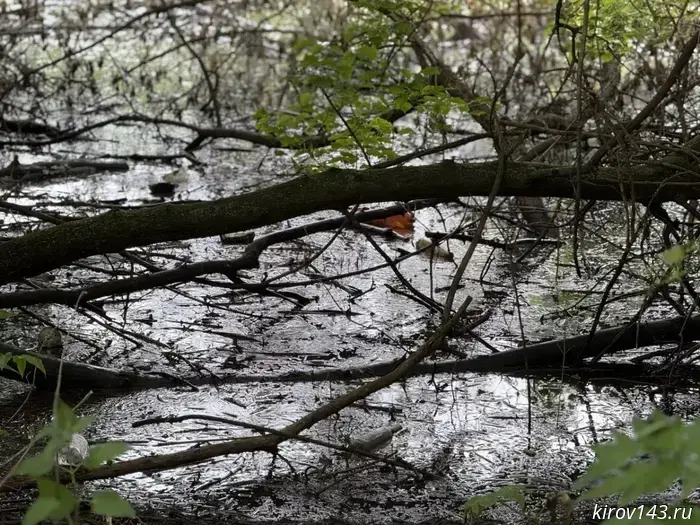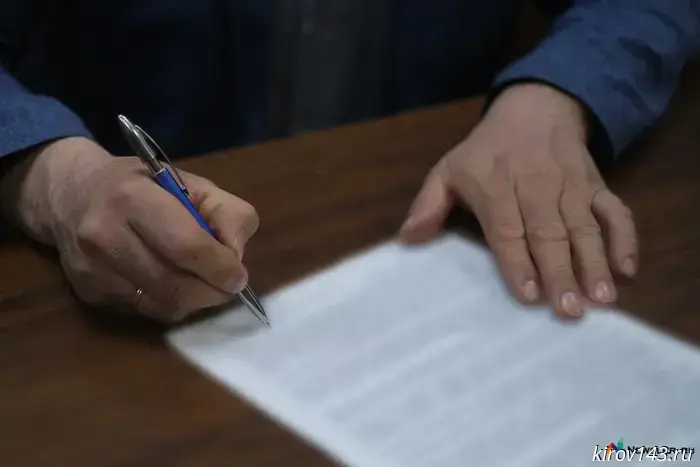
The Little Rows are stuck in big manure.
Previously, even residents of Kirov came here for the purest water, filling canisters with it, while locals salted cucumbers right at the spring. Now, according to the Hygiene and Epidemiology Center, the water is contaminated with coliform bacteria — it cannot be drunk or even used to wash vegetables without boiling.
This forced residents to seek help. On Thursday, June 3, one local woman, Larisa Veniaminovna, held a solo picket at the government building with a sign: "Return Nature to Ryabi!". Fortunately, she unexpectedly met Governor Alexander Sokolov, who promised to investigate.
What happened?
We decided to see for ourselves what is happening in Malye Ryabi. First, we went to the spring. A notice from the Hygiene and Epidemiology Center hangs there, warning that spring water cannot be consumed or used without boiling due to microbiological contamination. In other words, fecal matter has entered the spring water because of a sewer collector rupture.
A local resident, upon seeing strangers, said that after the accident, the booth was restored by representatives of Kirov BHZ — the water flow washed away the previous structure. According to him, heavy rains and sewage runoff dispersed garbage and washed away the dam. He then led us down to the ravine.
The sight before us is not just shocking — it’s horrifying. All slopes and lowlands are filled with waste: bottles, broken dishes, basins, canisters, plastic bottles, and an unimaginable number of plastic bags, whose contents are surprisingly diverse, including in taste.
Something raises suspicion — this accumulation didn’t happen over a year, but over decades! And apparently, no one here has heard of civilized waste management. Our guide indirectly confirms this, especially when we point out abandoned construction debris dumped right on the road just meters from the spring.
[Photos from 1 to 18]
But even more disturbing, accompanied by a stench of putrefaction, awaited us elsewhere in Malye Ryabi. Here, if you walk down the road from the named stop, past the collector and "Avtokomfort," there is a never-drying "lake." This, apparently, formed from a snow dump. However, calling this toxic and foul-smelling "broth" a lake is hardly appropriate.
Although authorities will never officially admit it, the fact is obvious: if snow had not been brought here and efforts had been made to clean up the melting snow collected from Kirov roads — which, as we understand, is contaminated not only with precipitation but also city life and reagents — such a mess wouldn’t exist. Even an inexperienced observer can see: in the lowland, among trees, with many underground sources, the "putrid lake" would not dissipate on its own!
Adding to this are tons of waste (by rough estimate), including film and God knows what else, creating a potentially hazardous site and dissatisfaction among those who, effectively, are trashing it with their own hands.
Most likely, if not for the sewer collector burst on Dzerzhinsky in early June, everyone would stay silent. But now, the city authorities have a perfect chance to shift blame — as they say, onto a sick head instead of a healthy one.
[Photos from 1 to 6]
Let’s recall what exactly happened here. In early June, soil collapsed into the sewer collector on Dzerzhinsky Street in Kirov. A similar incident occurred in April 2021.
For four years, Kirov officials knew that it was dangerous to operate the section of the sewer collector that serves the southwest and industrial enterprises. They knew this not only in the city administration but also in oversight and law enforcement agencies, which received relevant reports as early as 2021, but did not react.
[Photos from 1 to 5]
The soil collapse on the sewer collector in Kirov could have been avoided. It turned out that "Avtokomfort" and the nearby tire center not only extensively used the area above the engineering communications, but also compacted it, filling it with gravel, and parked heavy trucks there. Vibration from the road and constant pressure led to the soil collapse and pipe rupture. Heavy rains then completed the disaster — the sewage surged downhill toward Malye Ryabi, the "putrid lake," and the illegal dump, directing everything into a single flow. No wonder the "waters became bitter."
We were told that the flow of sewage, reaching up to 1900 cubic meters per hour, could have been stopped by shutting off water in the southwest. That would have been proper, but likely not welcomed by residents and factories who would have had to live without utilities until the accident was fixed. Instead, those dealing with the rupture had to literally wade into the sewage.
To prevent trucks from parking there again, the collector was fenced off with an additional ring after the repair. But when we arrived, we saw vehicles and tracks again on the site where the communications are located.
[Photos from 1 to 5]
Place of accountability
On Thursday, June 3, Larisa Veniaminovna, a resident of Malye Ryabi, went on a solo picket accompanied by eco-activist Valery Semenishchev, who is involved in the residents’ issues, to the Kirov region government building. The demand was: "Return Nature to Ryabi."
By a fortunate coincidence, she met the regional governor, Alexander Sokolov, who immediately took the matter under his control. By 4 p.m., a meeting was held at the city administration, which, according to reports, devolved into a "blame game."
[Photo: Valery Semenishchev]
Thus, the city authorities insist that Kirov biochemists pump out the water from the formed lake. Incidentally, no one even knows the depth of this "putrid broth," but even by the most modest estimates, the volume of toxic sludge could exceed 10,000 cubic meters. Clearly, the biochemists — who, to be honest, are also victims in this situation — do not want to clean up this mess because they are not responsible for it.
The most surprising thing is that at the meeting, there was no representative from "Avtokomfort," which would have been logical to involve. Meanwhile, biochemists ordered an expert examination to determine who is responsible for this.
While officials are arguing, residents of Malye Ryabi remain without clean water. And it seems that returning it will take a very long time.
Другие Новости Кирова (НЗК)
 Kirov residents do not want to receive their salaries in digital rubles.
Only 6% of Kirov residents are willing to switch to digital currency payments. Most respondents fear being left without money due to potential system failures.
Kirov residents do not want to receive their salaries in digital rubles.
Only 6% of Kirov residents are willing to switch to digital currency payments. Most respondents fear being left without money due to potential system failures.
 An employee of the city administration was found with 5 million of unknown origin.
The Prosecutor's Office of the Kirov Region has filed a lawsuit with the court demanding the transfer to the state treasury of over 5.1 million rubles received into the accounts of a Kirov administration employee and her husband. The legality of receiving these funds has not been confirmed.
An employee of the city administration was found with 5 million of unknown origin.
The Prosecutor's Office of the Kirov Region has filed a lawsuit with the court demanding the transfer to the state treasury of over 5.1 million rubles received into the accounts of a Kirov administration employee and her husband. The legality of receiving these funds has not been confirmed.
 In Kirov, an official is being required through court to confiscate more than 5 million rubles.
The Prosecutor's Office of the Kirov Region has filed a lawsuit demanding the recovery of funds from a municipal employee, the legality of their origin not being confirmed.
In Kirov, an official is being required through court to confiscate more than 5 million rubles.
The Prosecutor's Office of the Kirov Region has filed a lawsuit demanding the recovery of funds from a municipal employee, the legality of their origin not being confirmed.
 Love horoscope: Leos need to clarify their relationships, and Aquarius should accept help from their loved one.
It has become known how each zodiac sign's personal life will turn out this upcoming Friday.
Love horoscope: Leos need to clarify their relationships, and Aquarius should accept help from their loved one.
It has become known how each zodiac sign's personal life will turn out this upcoming Friday.
 Only 8% of residents of the Kirov region rate their work as "ten out of ten."
Residents of the Kirov region rate their work an average of 5.3 out of 10. Only a few consider working conditions truly good, and every fourth person gives their employment a very low rating.
Only 8% of residents of the Kirov region rate their work as "ten out of ten."
Residents of the Kirov region rate their work an average of 5.3 out of 10. Only a few consider working conditions truly good, and every fourth person gives their employment a very low rating.
 Men in Russia rest more than women.
The average Russian spends a little over four hours a day on leisure.
Men in Russia rest more than women.
The average Russian spends a little over four hours a day on leisure.
The Little Rows are stuck in big manure.
Residents of the Malye Ryabi settlement in Kirov are raising the alarm: they are almost out of drinking water, which they obtained from a natural spring. The residents turned to the regional branch of the People's Front, eco-activists, and even held a picket in front of the government building. The cause is attributed to a sewer collector burst, but the actual problem is much more serious.
